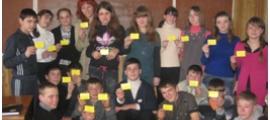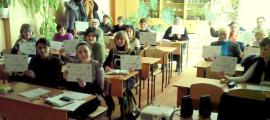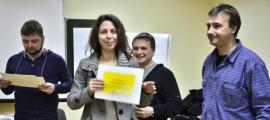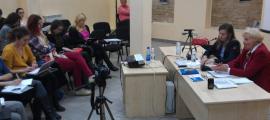The next hearing in the case of the Nigerian student Olaolu Sukanmi Femi was scheduled for 20 March 2013; he is being accused by the Lugansk Prosecutor's Office of an assassination attack against five young people. Nevertheless, the hearing was frustrated by the English interpreter, who admitted that she was not sufficiently competent and refused to continue to interpret. Thus, Femi, who, according to human rights activists and journalists, is the victim of a racially motivated crime, will soon "celebrate" 18 months of pre-trial detention on a very dubious charge.
The hearing lasted 15 minutes. Before its start, the new interpreter, who had been invited by the prosecutors during the night before the hearing, was trying to learn legal terms from a sheet of paper in the corridor of the court building. This did not help: the interpreter was unable even to translate the defendant's lawyers' petition for variation of the preventive measure. When asked to speak more clearly and loudly, she admitted that she did not have any interpreting experience and had only done literary translations before that and then refused to continue to interpret. The court gave the prosecutor 40 minutes to replace the interpreter; after the prosecutor was unable to do so, the court was adjourned till 15 April.
These events refute once again the prosecutors' unfounded allegations that the investigation took place with duly qualified interpreters present. Olaolu Femi himself has stated on numerous occasions that he was interrogated without a professional interpreter present, that he did not understand the people who were introduced to him as the interpreters, and that he doubts that his explanations were conveyed accurately.
The behaviour of the prosecutors in the course of the investigation in the case of Olaolu Femi looks increasingly like blatant bullying of the defendant and makes us suspect that the prosecutors are dragging out the proceedings intentionally, thus trying to make Femi give evidence that is favourable for the prosecutors.
Let us remind you that a number of procedural violations committed by the investigators were proven earlier in the trial: Olaolu Femi had indeed not signed any procedural documents in a language he does not understand, the qualifications of most interpreters had not been confirmed by any documents (the details of the interpreters involved are indeed absent from most of the minutes we have reviewed), and most of the investigative actions took part in the absence of his defence team (while the investigators have not supplied any documents that would justify this measure). The information concerning the extent of the victims' injuries provided in the bill of particulars is overstated; the allegations that Femi was intoxicated has been refuted by the forensic medical examiners (while alcohol intoxication of the alleged victims has been confirmed). All these facts testify to apparent purposeful distortion of the allegations against Olaola Femi, which has resulted in violation of the accused's rights that has continued to this day.
The Postup Human Rights Centre, the Without Borders Project of the Social Action Centre, the Ukrainian Helsinki Union of Human Rights, the German initiative group PRAVO. Berlin Group for Human Rights in Ukraine and the Regional Initiative Fund Ukrainian National Public Organisation have declared once again that procedural violations have been committed in the course of the investigation of this case and even more flagrant human rights violations committed by the investigators against Femi (for more detail, see http://goo.gl/xEitv). Our organisations appeal to the General Prosecutor of Ukraine to interfere in this case as quickly as possible and do all that is within his power to ensure that the forensic investigation procedures are carried out according to the standards of the right to a fair trial, which are, inter alia, reflected in the case law of the European Court of Human Rights. We appeal to the Plenipotentiary of the Supreme Rada of Ukraine to improve the monitoring of the proceedings in this case and to comment publicly on each violation of Olaola Sukanmi Femi's rights. We appeal against to the diplomatic missions of democratic states, intergovernmental human rights structures and international human rights organisations not to weaken the attention to the case of Olaola Femi and to raise this issue within the framework of the dialogue with the Ukrainian government.
More about the proceedings, as well as recordings of the hearings can be found at http://goo.gl/Ceeku
Justice for Olaolu Femi Initiative Group

































